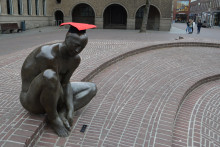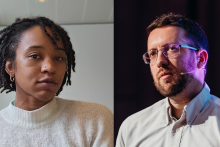'It bothered me that teachers didn’t pay attention to me'
For Olga Nielsen, the effects of structural underfunding indirectly led her to choose the ATLAS route a few years back. 'The tuition may have been much higher, but it bothered me that teachers didn't really pay attention to me a nd that I was a kind of number somewhere between 1 and 150, instead of Olga. That's better taken care of in ATLAS, because it's organized on a smaller scale.'
nd that I was a kind of number somewhere between 1 and 150, instead of Olga. That's better taken care of in ATLAS, because it's organized on a smaller scale.'
Nielsen went to a small college years ago, where there was a lot of focus on the students. She hoped to find herself in a similar environment at university 'But I soon missed the personal contact, and in large courses it is almost impossible to ask a lecturer a question. You can do that via e-mail, but a response often takes a long time and I think it's important to speak to a lecturer in real life.'
The student emphasizes that she does not blame the lecturers in this story. ‘You see that especially with large courses more and more students follow a lecture. As a result, some lecturers don't even get around to setting up a project anymore and only pass an exam because of the pressure. You also notice that researchers are so busy getting funding that the research itself does not get enough attention.’
For these reasons, Nielsen supports the Universities' Alarm Day to improve the situation for students, faculty and researchers alike. According to her, the corona crisis exacerbates already existing problems. 'But the problems didn’t appear because of corona. Even before the pandemic, there was a shortage of study places due to the huge increase in the number of students. It's not that the shortage of financial resources inhibited me as a student from anything, but I switched to ATLAS at the time for a reason.'
'Compare it to a train that just keeps rumbling along'
For Dopheide, the fact that universities are jointly sounding the alarm doesn’t come out of the blue. Certainly, the corona crisis has caused new problems, but even before the pandemic Dopheide saw an increasing number of lecturers or support staff suffering from burnout. And that, he says, can be traced indirectly to underfunding. 'You see larger and larger n umbers of students entering the campus, but the budget is not growing along with it. Something is going wrong in that imbalance. Corona has only magnified those problems. I see a lot of colleagues who are really at the limit, and it's not just because of corona.'
umbers of students entering the campus, but the budget is not growing along with it. Something is going wrong in that imbalance. Corona has only magnified those problems. I see a lot of colleagues who are really at the limit, and it's not just because of corona.'
With the ITC faculty, Dopheide falls somewhat within a 'relatively luxurious' exceptional position, due to specific funding, but that does not alter the fact that he does not see the enormous workload around him. ‘Compare it to a train that keeps rumbling along. Everything is so jammed together that there is no time to get off and think in peace. Almost all teachers have good ideas about education, but are not given the space to follow up on those ideas. New rules, internationalization and changes only increase that pressure. That is still sometimes underestimated.'
Dopheide therefore considers it a good signal that attention is being drawn to the problem by means of the Alarm Day. ‘The focus is on the 1.1 billion, but it's not just about money. Structural extra money can only have an effect, eliminating many problems. For me, good academic education is science as a foundation and, in addition, attention to the student. When students are asked about characteristics of a good teacher, attention always comes back. Attention to the teacher and a good academic foundation should always be leading.'
'It has come at a big personal cost’
 Birna van Riemsdijk has personally experienced how structural underfunding creates, as she says, ‘a hypercompetitive academic working environment’ and leads to immense stress. ‘I was very fortunate to obtain a Vidi personal grant in 2014. However, it has come at a big personal cost: within a year after I obtained the grant I was at home with a severe burnout, which has taken me two years to recover from. I was already very tired from the five year long process of obtaining the grant after my Veni application was rejected in 2009, which had diminished my resilience. And this was all while having a permanent contract. The stress that especially early career researchers on temporary contracts are under is really extreme. They depend on such funding, knowing that the acceptance rates are disproportionately low compared to the effort needed to obtain such funding.’
Birna van Riemsdijk has personally experienced how structural underfunding creates, as she says, ‘a hypercompetitive academic working environment’ and leads to immense stress. ‘I was very fortunate to obtain a Vidi personal grant in 2014. However, it has come at a big personal cost: within a year after I obtained the grant I was at home with a severe burnout, which has taken me two years to recover from. I was already very tired from the five year long process of obtaining the grant after my Veni application was rejected in 2009, which had diminished my resilience. And this was all while having a permanent contract. The stress that especially early career researchers on temporary contracts are under is really extreme. They depend on such funding, knowing that the acceptance rates are disproportionately low compared to the effort needed to obtain such funding.’
The scientist doesn’t believe that competitive funding is principally bad, but she thinks more options should be available to researchers. ‘I like the idea of a baseline funding that is always available to you, so that you can make more long-term plans, not being afraid you will run out of money before you can hire the next PhD candidate. I even enjoyed writing the Vidi proposal, it pushed me, but the balance is completely broken in the current system. The success rate is so low that it’s almost like you are competing, but you cannot really win.’
Not having to constantly write proposals and compete for funding would also benefit education, continues Van Riemsdijk. ‘Our research and teaching are of course connected. I have made a planning for this year, including an estimation of the amount of hours I expect to need for the various tasks. In short: the numbers just don’t add up. With a reasonable division over education, research and leadership tasks, the number of students I can supervise for their master project, for example, is much lower than what I am expected to take on. Individual supervision is very time intensive, but also incredibly worthwhile for both teachers and students. Taking on more students would mean either working more than my contract hours, spending less time on other tasks - in practice this typically means less research -, or reducing the supervision time. None of which is desirable for a healthy academic climate.’







